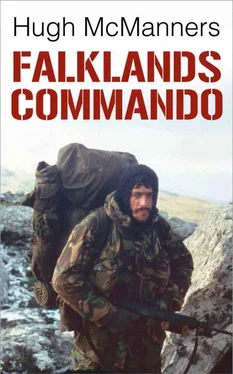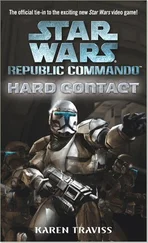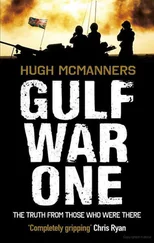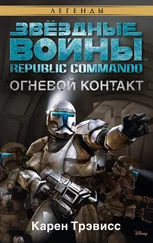Hugh McManners - Falklands Commando
Здесь есть возможность читать онлайн «Hugh McManners - Falklands Commando» весь текст электронной книги совершенно бесплатно (целиком полную версию без сокращений). В некоторых случаях можно слушать аудио, скачать через торрент в формате fb2 и присутствует краткое содержание. Город: London, Год выпуска: 2014, ISBN: 2014, Издательство: Nightstrike Publishing, Жанр: nonf_military, Биографии и Мемуары, на английском языке. Описание произведения, (предисловие) а так же отзывы посетителей доступны на портале библиотеки ЛибКат.
- Название:Falklands Commando
- Автор:
- Издательство:Nightstrike Publishing
- Жанр:
- Год:2014
- Город:London
- ISBN:978-0-992-81540-0
- Рейтинг книги:4 / 5. Голосов: 1
-
Избранное:Добавить в избранное
- Отзывы:
-
Ваша оценка:
- 80
- 1
- 2
- 3
- 4
- 5
Falklands Commando: краткое содержание, описание и аннотация
Предлагаем к чтению аннотацию, описание, краткое содержание или предисловие (зависит от того, что написал сам автор книги «Falklands Commando»). Если вы не нашли необходимую информацию о книге — напишите в комментариях, мы постараемся отыскать её.
Falklands Commando — читать онлайн бесплатно полную книгу (весь текст) целиком
Ниже представлен текст книги, разбитый по страницам. Система сохранения места последней прочитанной страницы, позволяет с удобством читать онлайн бесплатно книгу «Falklands Commando», без необходимости каждый раз заново искать на чём Вы остановились. Поставьте закладку, и сможете в любой момент перейти на страницу, на которой закончили чтение.
Интервал:
Закладка:
In the days before artillery had the range to be ‘indirect’, i.e. when they fired directly at the enemy, they could not be sited behind the protection of hills and fire over the top. In order to hit anything, the guns had to be deployed well in front of the infantry, usually to the flanks. This put the guns into very vulnerable positions and they were often attacked, with many heroic, classic, medal-winning actions fought to get them back again. In the smoke and confusion of the battle, being out in front, the gunners usually had the only clear view of what was going on, and the infantry to their rear looked to them for moral support (as of course they continue to do today…).
To infantrymen looking anxiously from their squares and lines towards the gun positions, flustered gun crews suggested an incoming enemy assault. Gunners running from the guns (even if only for a cup of tea) could trigger a general panic. The tradition arose that although gunners run forward to their guns as the order ‘Fire Mission battery’ is shouted, when the mission is over the crews will form two ranks behind the gun, about turn in unison and march rearward from the gun, regardless of the situation. Our gunners did this in the mud and driving rain of the Falklands, in exactly the same way as they did in Korea, the World Wars, and before that.
The Argentine gunners were not so determined – nor so dedicated. As soon as they perceived the noise of incoming shells that might be intended for them, they fled the guns and ran for their protective holes in the rocks. Some half hour later, their sergeant-major or officer would emerge to scour the rocks and get them back to work.
Nick and I had worked out eight-figure grid locations for all the targets. Guns firing on this data were accurate to within a ten-metre square. Given the speed at which the Argentine gunners abandoned their guns whenever artillery shells came anywhere near, I decided not to adjust fire using single rounds as is the usual procedure.
Instead, I’d order all guns in the battery allocated to us fire three or four rounds, as fast as they could, directly onto an eight figure grid reference, so the enemy would not have the benefit of the warning that adjusting rounds give. We used proximity fuses when these were available, which sense the ground and explode the shell twenty metres above it. This creates a similar shot-gun effect to the navy’s variable time fuse settings. Thus without warning, the Argie gunners were subjected to a furious hail of shrapnel, an aerial ambush which lasted about half a minute.
There was no point in firing any further shells, as after 30 seconds the survivors would have gained the safety of the rocks, fear lending wings to tired feet. The horrifying severity of these sudden attacks clearly affected them, and we noted a very marked reluctance to come out of the rocks, even after an hour and more. Whenever shells landed in the general area of batteries we’d already attacked, their crews dropped everything and ran, and the time interval between us shelling them and the battery going back into action lengthened.
I wrote in my diary for 13 June:
Shelling a gun battery when it is in action firing at your own troops is actually quite satisfying.
We were called up on the regimental net by [Bombardier] ‘Blodger’ Green (who was in [Captain] Nick d’Appice’s OP party) who, with 2 Para on Wireless Ridge, was under heavy artillery fire. We could hear the noise of it over the radio.
Blodger was wondering if we could do anything about it for him. We had a quick look and none of the enemy positions we’d tagged seemed to be firing, but there was another area we suspected was hiding a gun battery. We were given 79 Commando Battery, transmitting an eight-figure grid reference to them along with an order to fire 4 rounds fire for effect. As the shells came down, we could see men run for the rocks and a bright flame as an ammunition dump exploded, although the guns themselves were hidden in dead ground. Blodger came back up on the radio to say the fire had stopped, that they were able to move on, and “Thank you”.
I wish they’d gone ahead with the plan to get guns forward and within range earlier. We could have done much more damage. (I understand that the gun batteries themselves were no problem, but would have needed a rifle company each to help protect them, plus a large number of helicopter flights to fly them and their ammunition into forward positions, when helicopters were in very short supply.) However, one must not indulge in this sort of criticism because decisions in battle are made in a very different environment with far from perfect information.
By concentrating artillery fire on the enemies’ gun positions we were able to overturn guns, set fire to ammunition and vehicles, and keep their crews away hidden in the rocks for long periods. The 155-mm howitzer position seemed to stop firing altogether, the gun we could see pointing skyward at the same angle our naval bombardment had left it several days earlier.
There was also enemy artillery firing from the south-east side of Sapper Hill, over the top and out of sight to us. We wondered if this was an unseen part of the ‘dead’ 155-mm howitzer’s battery, so we ‘walked’ a few shells over the top of the hill and into the dead ground beyond out of sight, to see if that would silence them. The results were inconclusive so I did not waste any more ammunition on it.
According to the handbook, artillery shooting is supposed to be a snappy, tense affair with the officer barking orders to the bombardier who queries them only in certain clearly specified instances; then the signaller sends them. In our case the signaller was freezing quietly to the rear doing sentry duty, and couldn’t fit into our hole in the rocks anyway.
I was on one radio and Nick was on the other, often doing different fire missions, or ‘phoning round’ the frequencies to obtain a gun battery that was spare. We were very tired and cold so were making mistakes (like saying ‘left’ when meaning ‘right’), which the other would interrupt and correct. We would argue and contradict each other, take shortcuts to speed things up and get angry with people on the net. We’d tell jokes while waiting for the gun battery to process the data and fire the first rounds. We’d daydream to each other about what we were going to do when we got home (to the perfect world we’d left behind) whilst waiting for our next-in-line battery to finish off a fire mission for someone else.
During the shoots, our gun batteries were often reporting to us that a particular gun was ‘Out’, meaning that due to some problem it would not be able to fire. After some twenty minutes or half an hour the battery would report ‘Number Three In’ and that gun would fire again with the others. I only found out afterwards the reason for this.
In the soft, wet ground, the recoil progressively dug the gun’s trails backwards into the ground until the breech was recoiling into a quagmire, with the layer sitting with his legs horizontal and bottom in the water. At this point the crew would declare the gun out of action and use spades to dig it free. Every available person would then help pull it out of the hole and up onto to a fresh gun platform where it would continue firing. This would create another watery pit into which it sank once more.
The gun crews were working extremely hard, carrying the heavy crates of ammunition from where the helicopters had dumped them, to the guns, breaking the seals, separating out the huge amounts of packaging, assembling the required fuses onto shells, then laying out the shells and cartridge cases ready to fire.
During fire missions, they had to heave the heavy rounds to the guns, lay the gun, load and fire. The guns themselves would have initially been dug into pits for protection, and then when the firing caused them to bury themselves, their protection became less important than firing, and more labouring was required to dig them out again.
Читать дальшеИнтервал:
Закладка:
Похожие книги на «Falklands Commando»
Представляем Вашему вниманию похожие книги на «Falklands Commando» списком для выбора. Мы отобрали схожую по названию и смыслу литературу в надежде предоставить читателям больше вариантов отыскать новые, интересные, ещё непрочитанные произведения.
Обсуждение, отзывы о книге «Falklands Commando» и просто собственные мнения читателей. Оставьте ваши комментарии, напишите, что Вы думаете о произведении, его смысле или главных героях. Укажите что конкретно понравилось, а что нет, и почему Вы так считаете.












